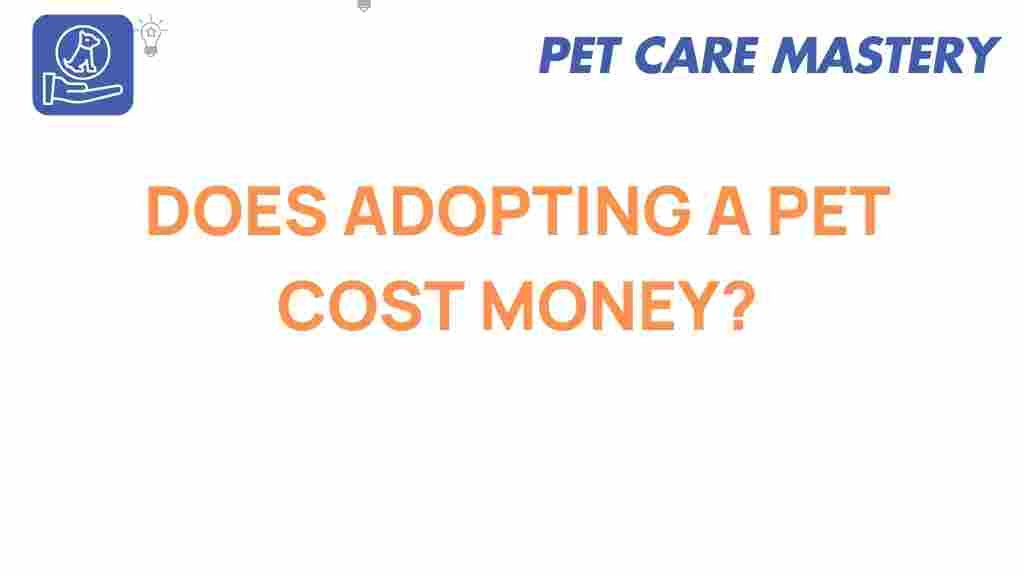The True Cost of Adopting a Pet: Understanding Pet Adoption Costs
Adopting a pet is one of the most rewarding decisions you can make. Not only do you provide a loving home for an animal in need, but you also gain a loyal companion. However, before you rush to the nearest shelter, it’s crucial to understand the pet adoption costs involved. While the initial adoption fee may seem manageable, the ongoing expenses can add up quickly. This article will guide you through the true costs of adopting a pet, helping you make an informed decision.
Understanding the Initial Adoption Fees
The first step in understanding pet adoption costs is recognizing the initial fees associated with adopting a pet. These fees vary widely depending on the type of animal, the shelter, and your location. Here are some common costs you might encounter:
- Adoption Fees: These can range from $50 to $300, depending on the species, breed, and age of the animal.
- Spaying/Neutering: Many shelters include the cost of spaying or neutering in the adoption fee, but if not, this could add another $100 to $300.
- Vaccinations: Initial vaccinations can cost between $50 and $150, depending on what your pet needs.
- Microchipping: This is typically a one-time cost of $25 to $50 and is essential for pet identification.
Before adopting, it’s wise to check with your local shelter about what fees are included in the adoption process. Understanding these initial costs is essential for budgeting your pet’s needs.
Ongoing Costs of Pet Ownership
Once you’ve adopted your furry friend, there are ongoing costs to consider. These pet adoption costs will vary depending on the type of pet you choose. Below is a breakdown of common ongoing expenses:
Food and Supplies
- Food: Expect to spend between $20 and $100 per month, depending on your pet’s size and dietary needs.
- Basic Supplies: Things like litter, grooming tools, leashes, and collars can cost around $30 to $100 upfront and recurring costs.
Healthcare
- Routine Vet Visits: Annual check-ups can cost between $50 and $200. This does not include emergency visits.
- Medications: Depending on your pet’s health, monthly medications can range from $10 to $50.
- Pet Insurance: This can help offset some costs and generally ranges from $20 to $60 per month.
Grooming and Training
- Grooming: Depending on the breed, grooming can cost anywhere from $30 to $100 per session.
- Training Classes: These can range from $100 to $300 for a series of classes.
Other Expenses
- Boarding or Pet Sitting: If you travel, consider the costs of boarding, which can be $25 to $50 per night.
- Miscellaneous: Toys, treats, and other pet-related expenses can add an additional $10 to $50 monthly.
In total, the ongoing costs of pet ownership can range from $500 to $2,000 per year, depending on the type of pet and your choices.
Calculating the Total Cost of Pet Adoption
To get a clearer picture of what pet adoption costs will entail, it’s helpful to calculate both initial and ongoing expenses. Here’s a rough estimate based on the information provided:
- Initial Costs: $200 (adoption fee) + $100 (spaying/neutering) + $100 (vaccinations) + $50 (microchipping) = $450
- Annual Ongoing Costs: $600 (food) + $200 (vet visits) + $300 (grooming) + $240 (insurance) + $100 (miscellaneous) = $1,440
Over the first year, you could expect to spend around $1,890 on your new pet. This figure can vary significantly depending on individual circumstances, so it’s essential to adjust as necessary.
Tips for Budgeting for Pet Adoption
Budgeting for pet adoption costs is crucial for ensuring that you can provide a happy and healthy life for your new companion. Here are some tips to help you plan effectively:
- Research: Understand the specific needs of the breed you wish to adopt, as some may require more care and resources than others.
- Create a Budget: Outline both initial and ongoing costs to see if you can comfortably afford a pet.
- Emergency Fund: Set aside money for unexpected vet visits or emergencies, as these can arise at any time.
- Consider Pet Insurance: This can save you money in the long run by covering unexpected medical costs.
Troubleshooting Common Adoption Concerns
Pet adoption brings joy but can also lead to concerns about finances and responsibilities. Here are some common issues and how to troubleshoot them:
1. Unexpected Medical Costs
If your pet has a sudden health issue, it can be a financial strain. To prepare:
- Have a savings account specifically for your pet’s medical needs.
- Look into pet insurance plans that fit your budget.
2. Behavioral Problems
Some adopted pets may have behavioral issues that require training:
- Seek out affordable training classes or consider online resources.
- Connect with local pet communities for advice and tips.
3. Time Commitment
Pets require time and attention. If you feel overwhelmed:
- Set a routine to ensure your pet receives the care they need.
- Consider hiring a pet sitter or using pet daycare services.
Conclusion: Is Pet Adoption Right for You?
While the pet adoption costs may seem daunting at first, the benefits of pet ownership far outweigh the financial commitments. By understanding the initial and ongoing expenses, creating a budget, and planning for unexpected costs, you can ensure a smooth transition for you and your new pet.
Ultimately, adopting a pet is a long-term commitment that requires preparation and dedication. If you’re ready for the responsibility, the unconditional love and companionship that come with pet ownership are truly priceless. For more tips on responsible pet ownership, check out this resource.
As a final note, don’t forget to visit local shelters and consider adopting a pet in need. Your new furry friend is waiting for you!
For further information on pet adoption processes and costs, visit Pet Adoption Resources.
This article is in the category Behavior and created by PetCareMastery Team
